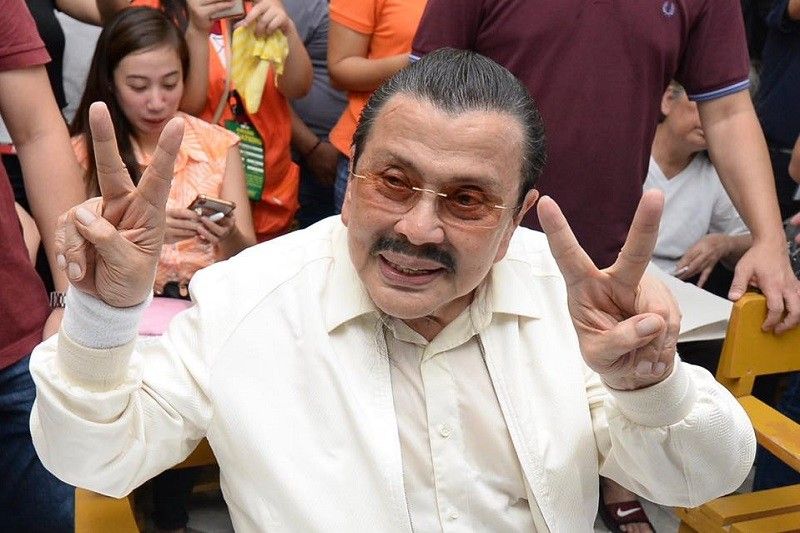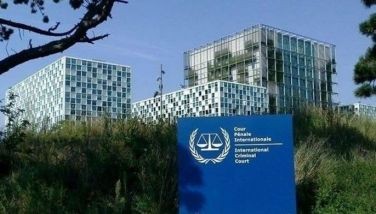Fact check: Erap says 'there is no such thing as political dynasty'

MANILA, Philippines — In an interview, Manila Mayor Joseph Ejercito Estrada claims that political dynasties are non-existent in the Philippines, a subject often debated in a country where many politicians come from the same families.
"There's no such thing as dynasty," Estrada said after voting at the P. Burgos Elementary School in Sta. Mesa.
The populist former head of state who was ousted in 2001 maintains that voters have a choice on who they want to vote for.
"Dynasty, you inherit it. The people decide for us. It’s the voice of the people so it’s the voice of God," he told reporters, Monday.
The 82 year-old's position is being contested by former Mayor Alfredo Lim and former Vice Mayor Isko Moreno.
The actor-turned-president has relatives currenty in elective office, namely:
- Sen. Joseph Victor "JV" Ejercito, his son
- San Juan City Mayor Guia Gomez, JV's mother
Other relatives and members of his immediate family are also hoping to be elected:
- Former Sen. Jose "Jinggoy" Estrada Jr., Erap's son, who is seeking a fresh Senate mandate
- Jerika Ejercito, his daughter, who is running for councilor in the 4th District of Manila
Estrada's legal wife, Dr. Luisa "Loi" Ejercito also served as senator from 1998 to 2001.
The patriarch of the Estrada-Ejercito clan also claimed in 2015 that they were not building a political dynasty.
Contested definition of 'political dynasty'
But is there a strand of truth to his claim?
According to Article II Section 26 of the 1987 Constitution, political dynasties are supposed to be prohibited.
"The State shall guarantee equal access to opportunities for public service, and prohibit political dynasties as may be defined by law."
However, the said provision lacks an enabling law to implement and define it.
In the 17th Congress, there are currently three bills authored to define, prohibit and provide penalties for establishing political dynasties:
Senate Bill No. 1765 (pending second reading)
House Bill No. 825 (pending with the Committee on Suffrage and Electoral Reforms)
House Bill No. 3861 (pending with the Committee on Suffrage and Electoral Reforms)
All of which have differing definitions of the term "political dynasty."
SB No. 1765 defines it as:
"...the concentration, consolidation and/or perpetuation of public office and political power by persons related to one another within the second degree of consanguinity or affinity."
The above refers to the relatives of a person who may be the latter's sibling, whether full or half-blood, direct ascendant or descendant, regardless of legitimacy including their spouses.
Here, spouses refer to both legal and common-law wife/husband.
HB No. 825, on the other hand, says it:
"... exists when a person is the spouse of of an incumbent elective official or relative within the second civil degree of consanguinity or affinity of an incumbent elective official [who] holds or runs for an elective office simultaneously with the incumbent elective official within the same province or occupies the same office immediately after the term of office of the incumbent elective official."
It would also exist when two or more persons who are spouses (or partners), or are related within the second civil degree of consanguinity or affinity run simultaneously for elective public office within the same municipality, city or province, even if neither is so related to an incumbent elective official.
For HB No. 3861, it refers to the "concentration, consolidation or perpetuation of public office and political power by persons related to one another."
Under the third bill, a political dynasty relationship exists when:
"...a person who is the spouse of an incumbent elective official or a relative within the second civil degree of consanguinity or affinity of an incumbent elective official holds or or runs for an elective office simultaneously with the incumbent elective official within the same province, or occupies the same office immediately after the term of office of the incumbent elective official."
It shall also exist where two or more persons who are spouses or are related within the second civil degree of consanguinity or affinity run simultaneously for elective public office within the same province, even if neither is so related to an incumbent elective official.
"In case the constituency of the incumbent elective official is national in character, the above relatives shall be disqualified from running in any other national elective office," says the bill.
The intent of all three bills, while differing, run counter to Estrada's claim.
All of these bills will need to be refiled in the 18th Congress, which will meet in July.
Proliferation of clans
In 2003, economists Solita and Toby Monsod explained why political clans persist in Philippine society.
"(The) divisive, patrimonial nature of Philippine politics... may be such that that politics controlled by one family may be preferred if only to speed up consensus on a common vision, coordination of development projects and allocation of resources," said the mother and daughter in a paper for he United Nations Development Programme.
In 2007, then associate professor and chair of De La Salle University's Political Science Department Julio Teehankee said that "the two Houses of the Philippine Congress" have been home for 160 families in the last century.
He added that most of these families take their roots from local politics.
"Generally considered as a grouping within the elites of society, the political clan is basically composed of a family and its network of relations that actively pursues elective or appointive political office at the local and/or national level," says Teehankee.
"In many cases, the clan has also managed to maintain power through generations."
- Latest
- Trending





























